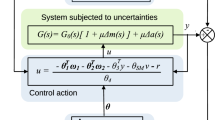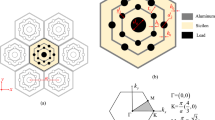Abstract
Polynomial chaos (PC) methods with Gauss-type quadrature formulae have been widely applied for robust design optimization. During the robust optimization, gradient-based optimization algorithms are commonly employed, where the sensitivities of the mean and variance of the output response with respect to design variables are calculated. For robust optimization with computationally expensive response functions, although the PC method can significantly reduce the computational cost, the direct application of the classical finite difference method for the analysis of the design sensitivity is impractical with a limited computational budget. Therefore, in this paper, a semi-analytical design sensitivity analysis method based on the PC method is proposed, in which the sensitivity is directly derived based on the Gauss-type quadrature formula without additional function evaluations. Comparative studies conducted on several mathematical examples and an aerodynamic robust optimization problem revealed that the proposed method can reduce the computational cost of robust optimization to a certain extent with comparable accuracy compared with the finite difference-based PC method.













Similar content being viewed by others
Abbreviations
- b :
-
Coefficients of polynomial chaos model
- d :
-
Dimension of design variables
- N :
-
Number of function evaluations
- m :
-
Dimension of random parameters
- E(•):
-
Operation of calculation expectation
- f(x):
-
Objective function
- g(x):
-
Constraint function
- p :
-
Order of polynomial chaos model
- K :
-
Accuracy level of sparse grid
- x :
-
Random design vector
- x :
-
Random design variable
- q :
-
Random parameter vector
- q :
-
Random parameter variable
- ω :
-
Gauss-type quadrature weight coefficient
- y(x):
-
Output response
- μ :
-
Mean value
- σ :
-
Standard deviation value
- Φ:
-
Multi-dimensional orthogonal polynomial
- φ :
-
One-dimensional orthogonal polynomial basis function
- DSA:
-
Design sensitivity analysis
- FDM:
-
Finite difference method
- FFNI:
-
Full factorial numerical integration
- MCS:
-
Monte Carlo simulation
- SGNI:
-
Sparse grid numerical integration
References
Abramowitz M, Stegun IA, Romer RH (1966) Handbook of mathematical functions with formulas, graphs, and mathematical tables. Phys Today 19(1):120–121. https://doi.org/10.1115/1.3625776
Beyer HG, Sendhoff B (2007) Robust optimization–a comprehensive survey. Comput Methods Appl Mech Eng 196:3190–3218. https://doi.org/10.1016/j.cma.2007.03.003
Blatman G, Sudret B (2011) Adaptive sparse polynomial chaos expansion based on least angle regression. J Comput Phys 230(6):2345–2367. https://doi.org/10.1016/j.jcp.2010.12.021
Cheng Q, Wang SW, Yan CC (2016) Robust optimal design of chilled water systems in buildings with quantified uncertainty and reliability for minimized life-cycle cost. Energ Buildings 126:159–169. https://doi.org/10.1016/j.enbuild.2016.05.032
Cho H, Choi KK, Lee I et al (2016) Design sensitivity method for sampling-based RBDO with varying standard deviation. ASME J Mech, Des 138(1):011405. https://doi.org/10.1115/1.4031829
Dodson M, Parks GT (2015) Robust aerodynamic design optimization using polynomial chaos. J Aircraft 46(2):635–646. https://doi.org/10.2514/1.39419
Du X, Leifsson L (2019) Optimum aerodynamic shape design under uncertainty by utility theory and metamodeling. Aerosp Sci Technol 105464. https://doi.org/10.1016/j.ast.2019.105464
Fisher J, Bhattacharya R (2011) Optimal trajectory generation with probabilistic system uncertainty using polynomial chaos. J Dyn Sys, Meas, Control 133(1):014501. https://doi.org/10.1115/1.4002705
Ghisu T, Shahpar S (2017) “Toward affordable uncertainty quantification for industrial problems-part i: theory and validation.” ASME Turbo Expo 2017: Turbomachinery Technical Conference and Exposition, 26–30 June, North Carolina, USA
Ghisu T, Shahpar S (2018) Affordable uncertainty quantification for industrial problems: application to aero-engine fans. J Turbomach 140(6):061005–061005-12. https://doi.org/10.1115/1.4038982
Harris CD (1981) Two-dimensional aerodynamic characteristics of the NACA 0012 airfoil in the Langley 8-Foot Transonic Pressure Tunnel. NASA Ames Research Center, NASA TM 81927
Janusevskis J, Rodolphe LR (2013) Simultaneous kriging-based estimation and optimization of mean response. J Global Optim 55(2):313–336. https://doi.org/10.1007/s10898-011-9836-5
Keshavarzzadeh V, Meidani H, Tortorelli DA (2016) Gradient based design optimization under uncertainty via stochastic expansion methods. Comput Method Appl M 306:47–76. https://doi.org/10.1016/j.cma.2016.03.046
Keshavarzzadeh V, Fernandez F, Tortorelli DA (2017) Topology optimization under uncertainty via non-intrusive polynomial chaos expansion. Comput Method Appl M 318:120–147. https://doi.org/10.1016/j.cma.2017.01.019
Kumar D, Raisee M, Lacor C (2018) Combination of polynomial chaos with adjoint formulations for optimization under uncertainties. In: Hirsch C et al (eds) Uncertainty management for robust industrial design in aeronautics. Springer, Cham. https://doi.org/10.1007/978-3-319-77767-2_35
Lee SH, Choi HS, Kwak BM (2008) Multilevel design of experiments for statistical moment and probability calculation. Struct Multidiscip O 37(1):57–70. https://doi.org/10.1007/s00158-007-0215-2
Lee SH, Chen W, Kwak BM (2009) Robust design with arbitrary distributions using Gauss-type quadrature formula. Struct Multidiscip O 39(39):227–243. https://doi.org/10.1007/s00158-008-0328-2
Lee I, Choi KK, Zhao L (2011a) Sampling-based RBDO using the stochastic sensitivity analysis and dynamic kriging method. Struct Multidiscip O 44(3):299–317. https://doi.org/10.1007/s00158-011-0659-2
Lee I, Choi KK, Noh Y et al (2011b) Sampling-based stochastic sensitivity analysis using score functions for RBDO problems with correlated random variables. ASME J Mech, Des 133(2):021003. https://doi.org/10.1115/1.4003186
Li J, Gao ZH, Huang JY, Zhao K (2013) Robust design of NLF airfoils. Chin J Aeronaut 26(2):309–318. https://doi.org/10.1016/j.cja.2013.02.007
Lucor D, Karniadakis GE (2004) Adaptive generalized polynomial chaos for nonlinear random oscillators. SIAM J Sci Comput 26(2):720–735. https://doi.org/10.1137/S1064827503427984
Miranda J, Kumar D, Lacor C (2016) Adjoint-based robust optimization using polynomial chaos expansions. In: VII European congress on computational methods in applied sciences and engineering, 5–10 June, Crete Island, Greece
Perkó Z, Gilli L, Lathouwers D, Kloosterman JL (2014) Grid and basis adaptive polynomial chaos techniques for sensitivity and uncertainty analysis. J Comput Phys 260(3):54–84. https://doi.org/10.1016/j.jcp.2013.12.025
Rehman S, Matthijs L, Fred VK (2014) Efficient kriging-based robust optimization of unconstrained problems. J Comput Phys 5(6):872–881. https://doi.org/10.1016/j.jocs.2014.04.005
Rumpfkeil MP (2013) Robust design under mixed aleatory/epistemic uncertainties using gradients and surrogates. J Uncertainty Anal Appl (1):7. https://doi.org/10.1186/2195-5468-1-7
Suryawanshi A, Ghosh D (2016) Reliability based optimization in aeroelastic stability problems using polynomial chaos based metamodels. Struct Multidiscip O 53:1069–1080. https://doi.org/10.1007/s00158-015-1322-0
Wang GL, Liu PQ (2016) A method of shape parameterization based on B-spline for wing design. Civil Aircr Desig Res (3):6–15. (In Chinese). https://doi.org/10.19416/j.cnki.1674-9804.2016.03.002
Wang F, Yang S, Xiong F et al (2019a) Robust trajectory optimization using polynomial chaos and convex optimization. Aerosp Sci Technol 92:314–325. https://doi.org/10.1016/j.ast.2019.06.011
Wang F, Xiong F, Chen S et al (2019b) Multi-fidelity uncertainty propagation using polynomial chaos and Gaussian process modeling. Struct Multidiscip O 4(60):1583–1604. https://doi.org/10.1007/s00158-019-02287-7
Wu X, Zhang W, Song S (2017) Robust aerodynamic shape design based on an adaptive stochastic optimization framework. Struct Multidiscip O 57(3):1–13. https://doi.org/10.1007/s00158-017-1766-5
Wu X, Zhang W, Song S (2018) Robust aerodynamic shape design based on an adaptive stochastic optimization framework. Struct Multidiscip O 57:639–651. https://doi.org/10.1007/s00158-017-1766-5
Xia Z, Luo J, Liu F (2019) Performance impact of flow and geometric variations for a turbine blade using an adaptive NIPC method. Aerosp Sci Technol 90:127–139. https://doi.org/10.1016/j.ast.2019.04.025
Xiong FF, Xiong Y, Greene S et al (2010) A new sparse grid based method for uncertainty propagation. Struct Multidiscip O 27(3):1118–1139. https://doi.org/10.1007/s00158-009-0441-x
Xiong FF, Yang SX, LIU Y et al (2015a) Analysis method of engineering probability uncertainty. Science Press (In Chinese), Beijing. https://doi.org/10.1016/j.tws.2007.05.007
Xiong F, Xiong Y, Xue B (2015b) Trajectory optimization under uncertainty based on polynomial chaos expansion. AIAA Guidance, Navigation, and Control Conference, 5-9 Jan, Kissimmee, Florida. AIAA 2015-1761. https://doi.org/10.2514/6.2015-1761
Xiu D, Karniadakis GE (2002) The Wiener-Askey polynomial chaos for stochastic differential equations. SIAM J Sci Comput 24(2):619–644. https://doi.org/10.1137/S1064827501387826
Xiu D, Karniadakis GE (2003) Modeling uncertainty in flow simulations via generalized polynomial chaos. J Comput Phys 187:137–167. https://doi.org/10.1016/S0021-9991(03)00092-5
Zhang Y (2013) “Efficient uncertainty quantification in aerospace analysis and design.” Ph.D dissertation, Missouri University of Science and Technology
Zhang Y, Serhat H (2013) Robust design optimization under mixed uncertainties with stochastic expansions. J Mech Design 135(8):081005. https://doi.org/10.1115/1.4024230
Zhang Y, Zhu P, Chen GL (2007) Lightweight design of automotive front side rail based on robust optimization. Thin Wall Struct 45(7):670–676. https://doi.org/10.1016/j.tws.2007.05.007
Funding
The work was supported by the National Numerical Wind Tunnel Project (grant number NNW2020ZT7-B31) and Science Challenge Project (grant number TZ2018001).
Author information
Authors and Affiliations
Corresponding author
Ethics declarations
Conflict of interest
The authors declare that they have no conflict of interest.
Replication of results
The results shown in the manuscript can be reproduced. Considering the size limit of the uploaded supplementary material, the codes for two of the mathematical examples for UP (Example 1 in Section 4.1 and Example 2 in Section 4.2) were uploaded as supplementary material. The remaining examples are very easy to implement by changing the response functions and sample points based on the codes provided to obtain the results shown in the manuscript.
Additional information
Responsible Editor: Erdem Acar
Publisher’s note
Springer Nature remains neutral with regard to jurisdictional claims in published maps and institutional affiliations.
Electronic supplementary material
ESM 1
(Zip 73.8 kb)
Rights and permissions
About this article
Cite this article
Ren, C., Xiong, F., Mo, B. et al. Design sensitivity analysis with polynomial chaos for robust optimization. Struct Multidisc Optim 63, 357–373 (2021). https://doi.org/10.1007/s00158-020-02704-2
Received:
Revised:
Accepted:
Published:
Issue Date:
DOI: https://doi.org/10.1007/s00158-020-02704-2




